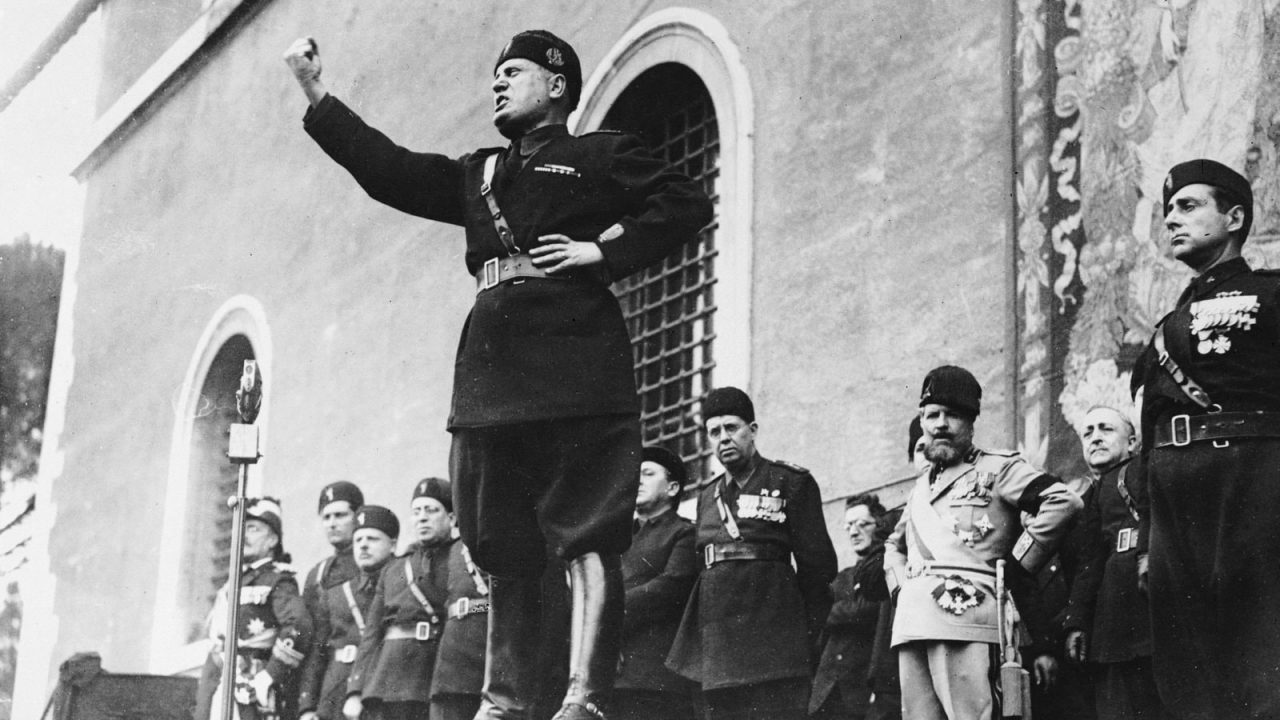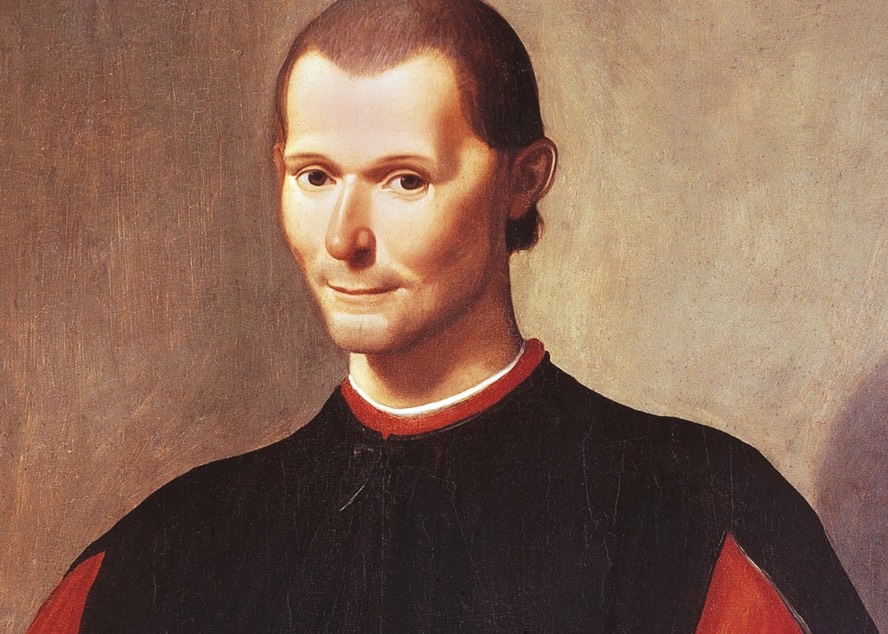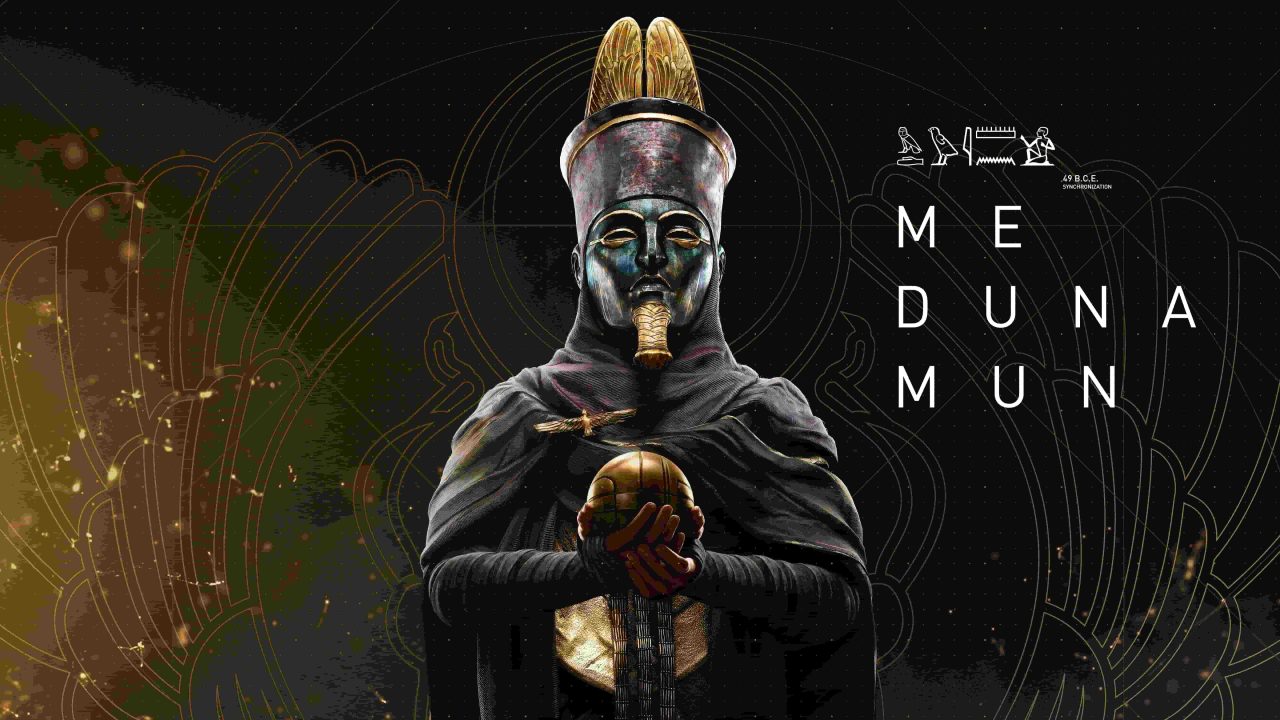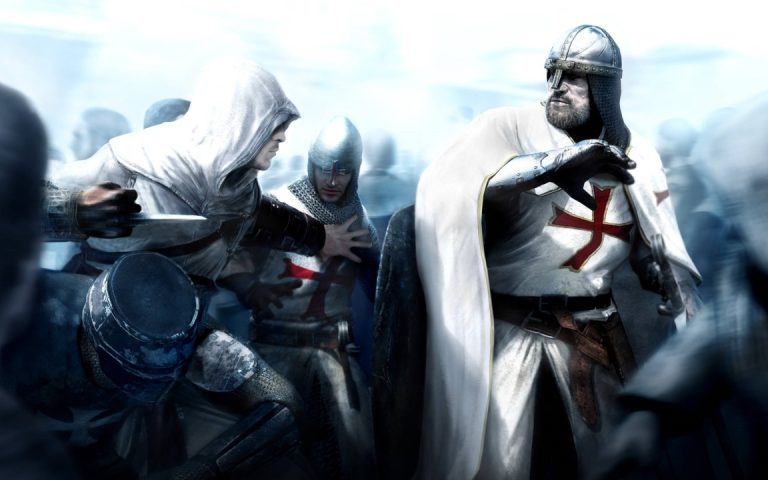By Amirhossein Rahnavard
In this article, we are going to examine the source of inspiration, beliefs, and possible viewpoints of the Assassin’s Creed series.
The conflict between liberalism and authoritarianism
Few people in the world of video games haven’t heard of the popular and beloved Assassin’s Creed series. A franchise that aimed to be a new installment of the Prince of Persia series has now become a symbol of Ubisoft. The stories of Assassin’s Creed typically place you in specific historical periods to play a role in a historical event. Although Ubisoft excels in creating atmospheres, one cannot deny the historical distortion and particular direction of them. For example, in the final scene of the first installment, you see King Richard I speaking about God’s judgment while he had massacred 2,700 Muslim prisoners, including innocent women and children, in the city of Acre. However, distortion is only part of the story!
The game seeks to depict two old and enduring ideologies (freedom and global order) throughout history. Naturally, the definitions of these two ideologies differ for every individual. You might be someone with a commune inclination who desires a shared world, or you believe the world needs a central government with authoritarian philosophy. Although the player always looks at the issues from the perspective of an Assassin, this does not mean that the Templars have bad beliefs! Maybe someone among us prioritizes security over freedom. Who says peace is only achieved through negotiation? Perhaps the Templar belief that peace is achieved only through power is correct. Thus, the liberal viewpoint can be attributed to the Assassins, while the Templars have authoritarian beliefs.
Assassin’s Creed seriously considers itself a follower of humanism to the point where humans escape from paradise for the sake of freedom! He (the human) does not desire to be under the shadow of any power but rather seeks excessive freedom. Humans no longer fall for the promise of paradise but now sketch their own world.

Benito Mussolini: “I did not create fascism. I extracted it from the subconscious of the Italians. If this were not the case, they would not have followed me for 20 years.” Despite the passing years, Mussolini still has staunch supporters. This shows that no belief is buried, and not all people in the world can be considered freedom loving or peace seeking.
This is for you, Mr. Mussolini
Contrary to common belief, Vladimir Bartol (author of the book Alamut) was very knowledgeable about Iranian history. The chosen characters, accurate descriptions and depictions of places, and the narrative of a time frame suitable to Bartol’s life conditions indicate his deep understanding and knowledge! Bartol’s goal was not to create a detailed historical book but to write a critique of his society for awakening against tyranny. One might see the wish to have a leader like Hassan-i Sabbah in his thoughts. Of course, one should not believe that Bartol dreamed of having a leader like Hassan-i Sabbah, and this is just one interpretation among thousands.
Vladimir Bartol was born in the city of Trieste, which has Slovenian origins. During Bartol’s life, the city of Trieste and Slovenian areas were harassed by Italian fascists led by Mussolini to increase their assets. Some consider Alamut a simple and exciting novel, while others see it as a political interpretation. From calling Hassan-i Sabbah a dictator like Stalin, Adolf Hitler, or even Mussolini, to linking Joseph Goebbels, the Nazi Party’s Minister of Propaganda, to Abu Ali, Hassan-i Sabbah’s servant, all might indicate Bartol’s political thoughts.
Some friends might consider such topics unnecessary, which is fundamentally a wrong belief. As stated at the beginning of the text, the game is based on two ideologies. In other words, the other writers of Assassin’s Creed, besides being inspired by the novel, also examined Bartol’s beliefs. Another notable point is the use of history to convey two concepts! These concepts are “freedom and truth.” Just pay attention to the game’s narrative style. Assassin’s Creed does not intend to clearly show its themes to the audience but instead narrates its story using necessary characters and history.
Some consider Bartol a nationalist. To prove this, we must go back to the years 1927 and 1941. At that time, Bartol’s close friend, Zorko Jelinčič, the leader and founder of a revolutionary organization called T.I.G.R (Trieste, Istria, Gorizia, Rijeka), along with young people with nationalist beliefs, clashed with the then Italian government. At that time, the Austro-Hungarian Empire included countries like Italy, Croatia, Slovenia, and a few other European countries. Italy, being a national state, was not interested in becoming multinational and thus opposed the Croatian and Slavic minorities. With the rise of the Fascist movement in 1922, Mussolini adopted anti-Slav policies. In 1923, the use of Slovenian and Croatian languages in all government offices, including post offices and public transport, was banned; anti-Slav actions continued throughout Mussolini’s life. In one of Bartol’s notes, it is mentioned: “Zorko, I will avenge you, my friend.” With this evidence, it can be easily determined that Bartol had intense hatred toward Mussolini and his governance style and supported his friend’s actions. However, at that time, due to the lack of freedom of speech, Bartol could not convey his intentions linearly to the audience because the outcome would have been death! The fear of the Fascist government and a deep look at the characters confirm Vladimir’s nationalism.
Describing Hassan-i Sabbah, Khayyam, and Nizam al-Mulk as three classmates is very interesting because each of them had different beliefs. For example, Hassan-i Sabbah, the leader of the Ismaili sect and the founder of the Alamut state, symbolizes a revolutionary and political ideology. He believed in using any means, including assassination, to achieve his goals and establish a government based on Ismaili principles. Omar Khayyam, a great Iranian poet, mathematician, and philosopher, is known for his philosophical quatrains. Khayyam might symbolize a scientific and philosophical ideology. He believed in seeking truth through science and philosophy and emphasized enjoying life’s moments in his poetry. Nizam al-Mulk, as a prominent Seljuk vizier and author, symbolizes a state and conservative ideology. He believed in maintaining order and stability through a strong central government and adhering to traditional and Islamic principles.
One might ask, could Bartol have been inspired by a specific source? The answer is yes! Bartol used the writings of Marco Polo, the Italian explorer and trader from Venice. Marco Polo entered Iran 200 years after Hassan-i Sabbah. In fact, Marco Polo retells the story from the locals of that region, who called Hassan-i Sabbah Aladdin. This false belief that Sabbah’s soldiers sat around smoking hashish came from the legends created by the people of that time (in the past, since the Ismaili sect conducted their affairs very secretly and mysteriously, many rumors were made, mostly by Western people). Hashashin (derived from the word hashish) meant drug dealer in the past, and these plants were easily accessible in Alamut’s geographical compulsion. Why do I say Hashashin? Because they were drug exporters at that time.
- Alamut means eagle’s nest.

Niccolò Machiavelli
A free man? How absurd
Pay attention to this sentence:
The end justifies the means.
Machiavelli
It is evident that Bartol follows Machiavellianism. This school of thought is also present in Assassin’s Creed. Machiavelli, a poet and political philosopher, believed that to achieve a powerful government, politics and ethics should be separated. No barrier, including religion, should obstruct the government (modern secular government). The one in power should not show fear of using violence against the people. In principle, you are allowed to resort to actions like assassination to maintain power. The goal is to maintain power, which justifies the means. Machiavelli proposed two controversial views, one of which addresses the nature of humans. Machiavelli believed that humans are inherently greedy, ruthless, and deceitful and prioritize personal interests when necessary. He also believed that a combination of fear and appeasement could govern this predictable mass. The second and most controversial view relates to religion! He believed that religion could be an effective tool for controlling people. In this way, even politicians could easily justify their actions. Machiavelli pointed to the Catholic Church and the Pope, who managed to gain immense influence. Pharaoh also, by calling himself a representative of the gods, is an example of this. Now it is time to have a deeper perspective on this sentence. Hassan-i Sabbah says:
Nothing is true; everything is permitted.
In the novel Alamut, Hassan-i Sabbah uses religion to achieve his goals. He explains that humans are free to take any action to achieve their beliefs. If you desire to reach your dream, don’t worry about betraying your friends because the most important principle is yourself! The saying “politics has no parents” is a true and bitter statement. Along with mysterious atmosphere and created legends, and of course, declaring solidarity with the people, he attracted them to his sect.

Human nature says that he is inherently seeking power
Dreaming of Reaching Paradise
In a part of the introductory section of the article, we mentioned the escape of humans from paradise. But why should Adam and Eve leave paradise? Is there any purpose for humans other than reaching paradise? To find the answer, we first need to delve into the religious meaning of ‘paradise.’ In religious texts, humans must follow a set of divine laws to attain the true position (paradise). It is where humans can reach by controlling their base desires. In my opinion, having precise definitions is difficult because each living being’s beliefs about these matters differ; it is human belief that shapes reality! With these interpretations, the authors of Assassin’s Creed are not far-fetched! They have their own beliefs.
In the Assassin’s Creed series, paradise serves as a metaphor for control and exploitation of people through religion. Among all the Pieces of Eden, there is one piece that closely resembles the biblical account of Adam and Eve’s expulsion from paradise. This piece, known as the Apples of Eden, has multi-layered meanings that we’ll briefly explore below.
- These apples are introduced as tools that grant the holder the ability to control others’ minds and wills. This concept signifies absolute power and alludes to the temptation and corruption inherent in power. In the game’s narrative, these apples were used by the First Civilization (Isu) to control humans.
- The Apples of Eden symbolize knowledge and awareness. In the Torah, eating the forbidden fruit leads to Adam and Eve’s awareness of good and evil, resulting in their expulsion from paradise.
- In various stories, the apple of Eden is portrayed as a symbol of temptation leading to corruption and downfall. These apples can also tempt individuals and grant them power that can be misused.
- This piece is the primary source of conflict between Assassins and Templars. Assassins seek to prevent misuse of these apples, preserving human freedom and will, while Templars believe that using these apples can establish complete order and control over the world. This conflict reflects opposing views on order, freedom, and power.

The Ismaili community
Everything started with a dispute
The Ismaili sect is one of the branches of Shia Islam, known by the name of Imam Isma’il ibn Ja’far al-Sadiq, the sixth Imam of the Shia. Throughout history, this sect has divided into two major branches: Nizari and Musta’li. Ismailis have played an important role in Islamic and Iranian history due to their beliefs and cultural and political activities. As a separate sect, the Ismailis emerged from Twelver Shia. After the death of Imam Ja’far al-Sadiq (peace be upon him), some Shi’as believed in his son Isma’il as the seventh Imam. Others adhered to the Imamate of Musa al-Kazim, another son of Imam Ja’far al-Sadiq, and became known as Twelver Shia.
In the late 11th century CE, Ismailis split into two main branches: Nizari and Musta’li. The Nizaris followed Nizar ibn al-Mustansir Billah, a Fatimid caliph, and were primarily concentrated in Iran and Central Asia. The Musta’lis, who followed al-Musta’li ibn al-Mustansir Billah, were more active in Yemen and India. Hasan-i Sabbah belonged to the Nizari branch. Ismaili beliefs are based on monotheism and the recognition of God, with a strong emphasis on the connection between reason and faith.
An interesting and significant aspect related to this branch is their use of assassination. Hasan-i Sabbah indeed employed assassination tactics against his enemies, but in the novel, we witness some embellishments for dramatic effect. In reality, Hasan-i Sabbah was highly intelligent and skilled in military tactics. Contrary to the novel’s portrayal, he was deeply connected to the Ismaili school of thought, to the extent that he established an independent state. His special forces, known as the Fida’is of Hasan-i Sabbah, were truly formidable assassins. These Fida’is underwent rigorous military and religious training and carried out assassinations. One of their notable targets was Khwaja Nizam al-Mulk. Besides military and religious training, the Fida’is were encouraged to study various sciences. In Ismaili strongholds like Alamut Castle, there were large and rich libraries containing books on diverse subjects, including philosophy, medicine, mathematics, astronomy, and natural sciences. Hasan-i Sabbah placed great importance on the education and scientific upbringing of the Fida’is, encouraging them to learn languages, cultures, and various fields of knowledge. This enabled the Fida’is to infiltrate different societies and gather necessary information.
Thank you for accompanying us throughout this article!



Comments